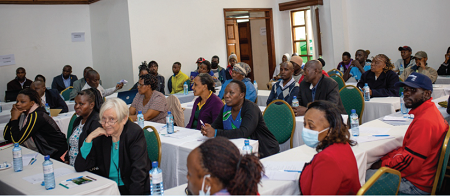Women’s Spaces Project Launched at the NEFSALF Meeting
Nairobi and Environs, Food Security, Agriculture and Landscape Forum (NEFSALF) is a place for deliberation on the food system of Nairobi city. For twenty years, beginning in 2002, it has been convened by Mazingira Institute. NEFSALF brings together small producers, processors and distributors, as well as mentors, officials, CSOs, researchers and scholars. The forum includes Women`s and Mentors Hubs.
The most recent NEFSALF meeting took place on 15 September 2022 at the Desmond Tutu Conference Centre. The programme included the launch of the Women`s Space s Project, presentations on training in urban agriculture and the food system, the Food System Strategy of the Nairobi City County (NCC) and reports from farmers in action.
The Women`s Spaces Project is a regional initiative taking place in four countries in Sub-Saharan Africa: Kenya, Uganda, South Africa and Angola. It is coordinated by Rooftops Canada-Abri International and executed with the financial support of the Government of Canada, through Global Affairs Canada (GAC). The initiative is guided by Canada`s Feminist International Assistance Policy.
The project in Kenya is executed by Mazingira Institute, in collaboration with the Food and Agriculture Sector, Nairobi City County. The intent is to advance gender-equal access to land and resources for urban agriculture.
In Uganda, South Africa and Angola the more general intent is to implement gender equal rights to land, housing and livelihoods. At the December meeting, Kimani Mungai, Development Officer at the Canadian High Commission, represented Janine Cocker, Head of’ Cooperation. He noted the continuing collaboration between Mazingira Institute and the Commission, and said “Canada`s commitment to
gender equality and women`s economic empowerment is unequivocal, and this project is a great example of how it can be done.”
Mary Kibira, Acting Chief Officer, Food and Agriculture Sector of Nairobi City County, acknowledged and appreciated the presence of representatives from the Canadian High Commission , Mazingira Institute, Nairobi City County and farmers. She said as a follow-up to the meeting, her team, in liaison with the participants present, will consolidate data available on different groups doing various types of urban
farming.
Albert Miare, a long-standing NEFSALF participant and Mazingira Institute trainee who farms in Kasarani, said “I have been practicing mixed farming, growing vegetables and rearing dairy cows since 2007. The
produce from the farm is sold to earn an income.” He mentors other farmers and encouraged
those at the meeting to take up the upcoming training for urban agriculture and the food system
at Mazingira Institute. Albert, to his credit, was elected the chairperson of the Food Liaison
Advisory Group (FLAG) at its first meeting in July. It is the stakeholder engagement component of the NCC Food System Strategy.
He stated “FLAG brings all stakeholders in the food sector together, to deliberate on various issues as well as give solutions.”
Download the entire newsletter here.














